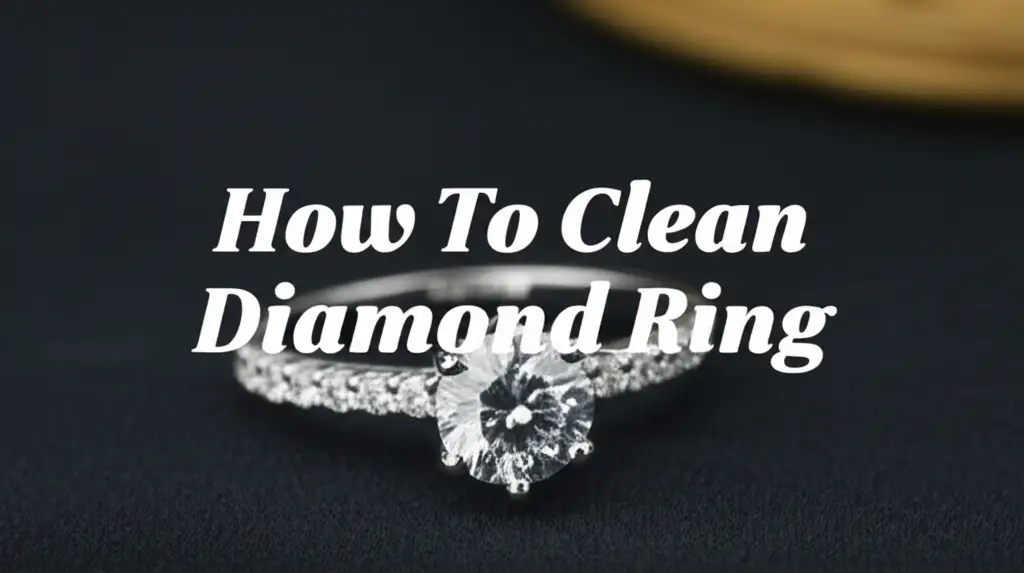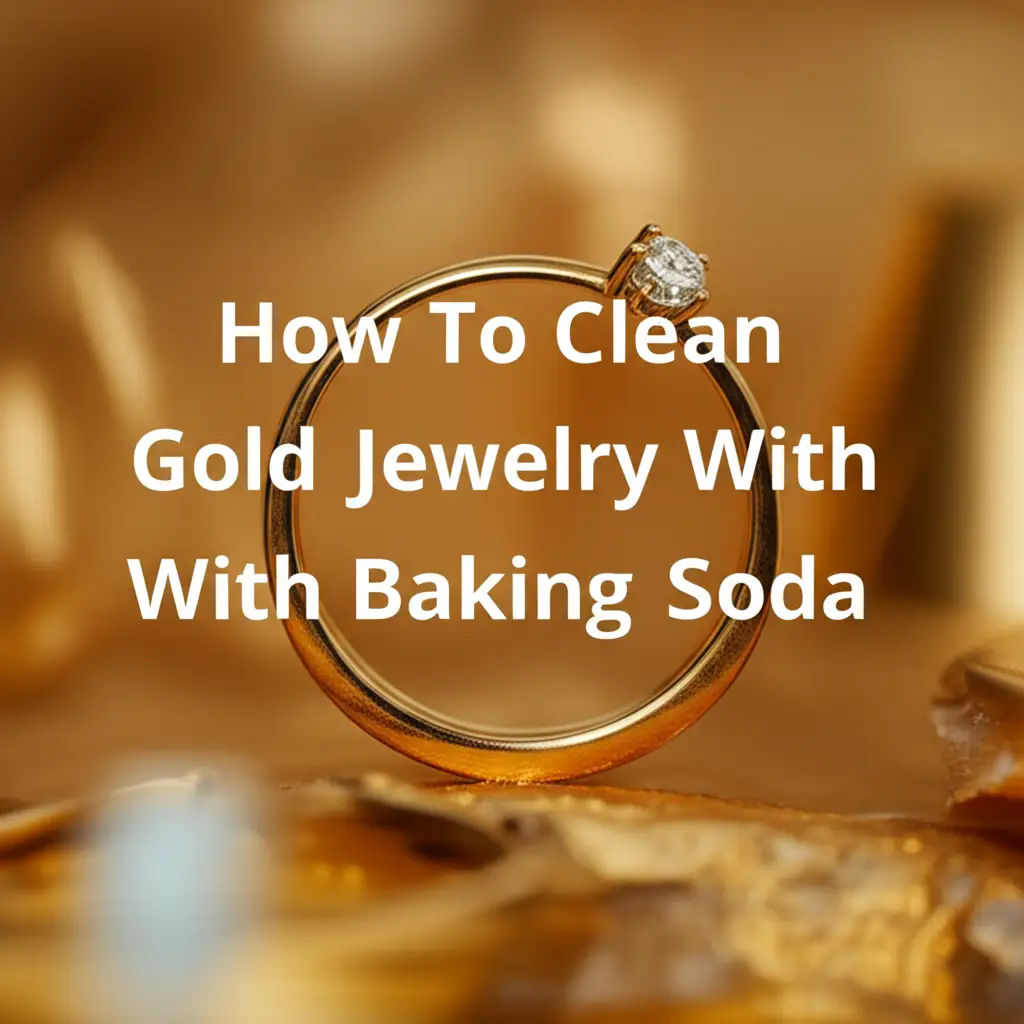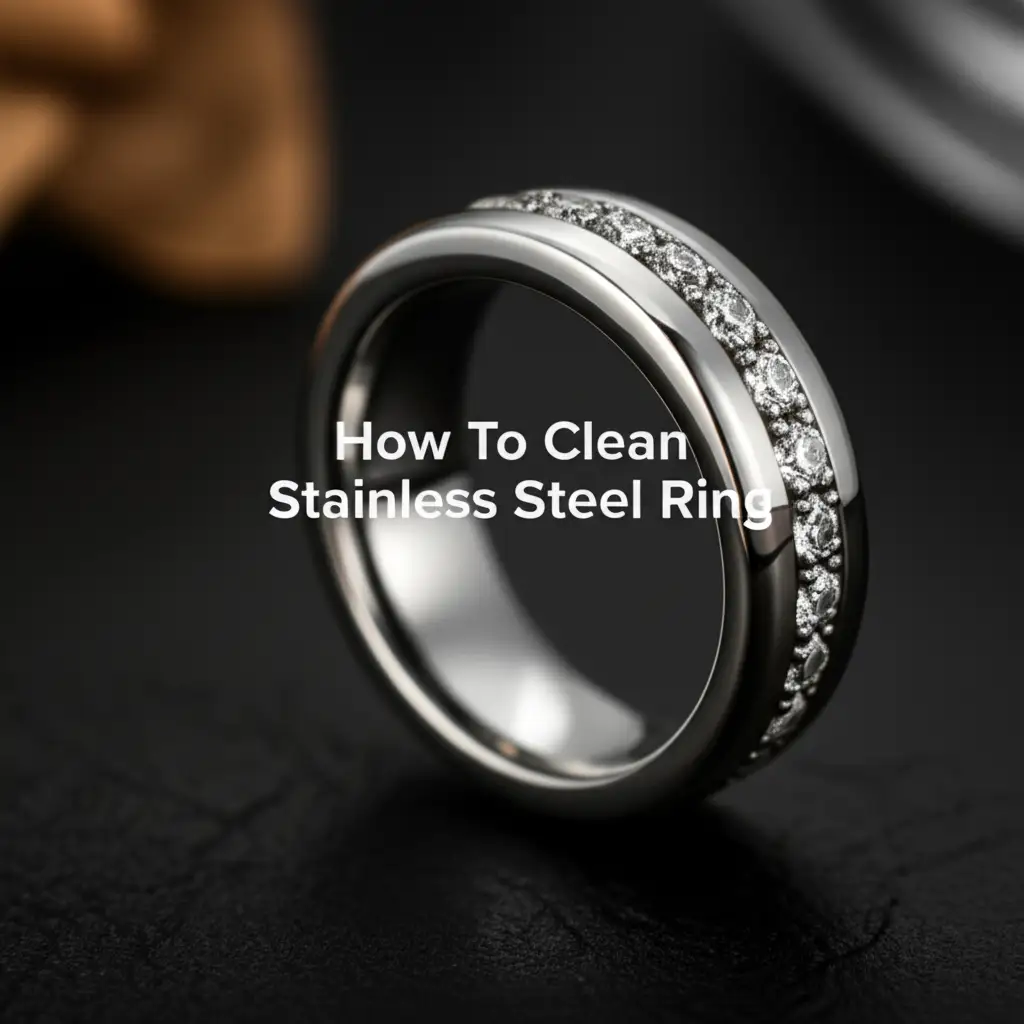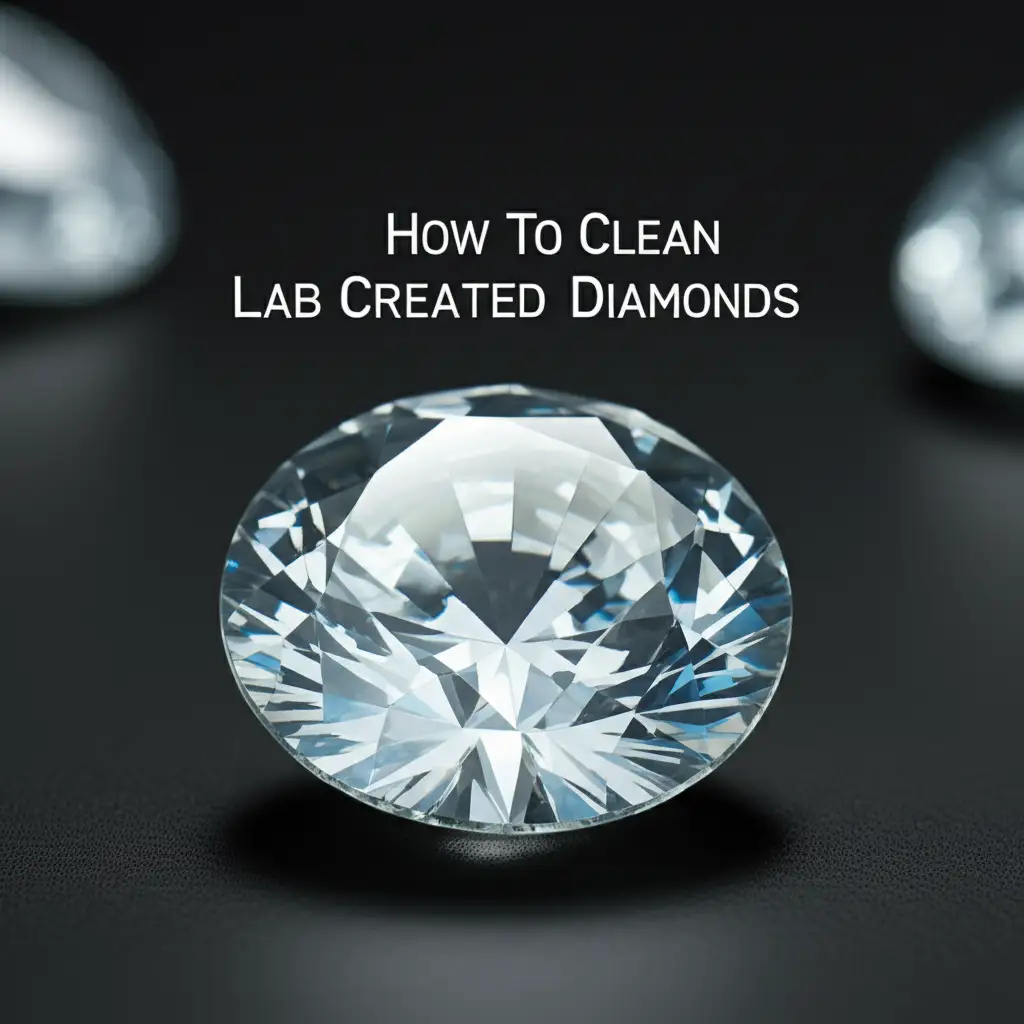· Jewelry Care · 17 min read
How To Clean Diamond Ring Vinegar
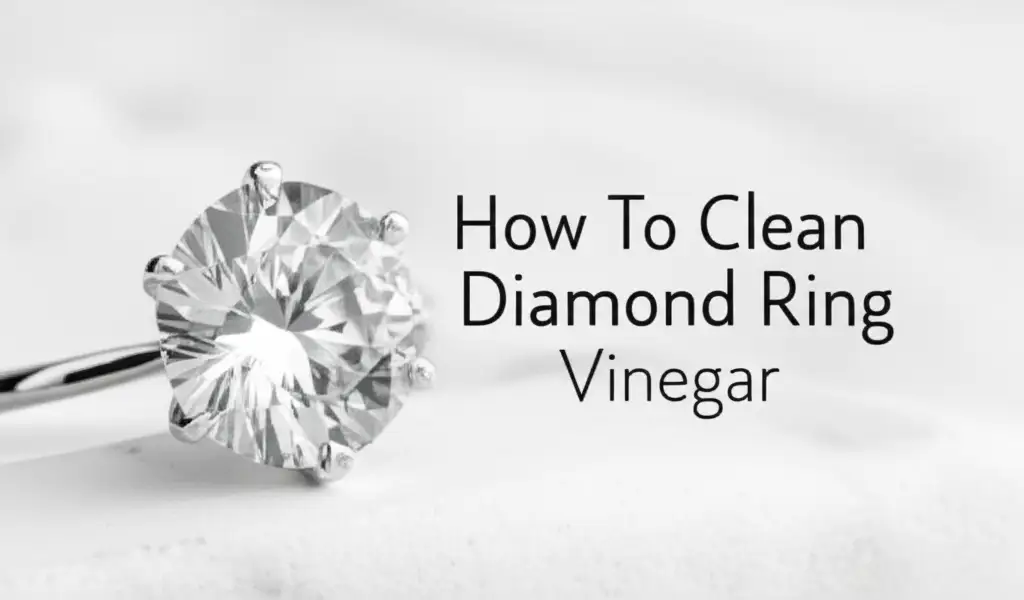
Discover How To Clean Diamond Ring with Vinegar Safely
Your diamond ring shines bright. Over time, it collects dirt and oils. Daily wear makes diamonds lose their sparkle. You want to bring back that original brilliance. Many commercial cleaners exist, but some people prefer natural options. Vinegar is a common household item. It can clean many things. You might wonder if it works for your precious diamond ring.
This article shows you how to clean diamond ring with vinegar. We explore why vinegar effectively cleans jewelry. We list the supplies you need. You will get a clear, step-by-step guide. We also discuss when to avoid vinegar on certain ring types. You will find tips for extra shine and long-term care. Learn how to keep your diamond sparkling with simple, safe methods.
Takeaway
- Use white vinegar diluted with water.
- Soak for 10-15 minutes, then gently scrub.
- Rinse thoroughly and dry with a lint-free cloth.
- Avoid vinegar on porous gemstones or soft metals.
To clean a diamond ring with vinegar, mix equal parts white vinegar and warm water. Soak your diamond ring for 10-15 minutes to loosen grime. Use a soft brush to gently scrub the diamond and setting. Rinse the ring thoroughly under cool running water and dry it with a lint-free cloth for a brilliant shine.
Understanding Why Vinegar Cleans Diamond Rings So Well
Vinegar is a common household product. It is known for its cleaning power. The main reason vinegar works is its acidity. White vinegar usually contains about 5% acetic acid. This acid helps dissolve various types of buildup. Dirt, grease, and oil can dull a diamond’s shine. They coat the stone and block light. Vinegar breaks down these residues.
Think about how soap scum builds up in a shower. Vinegar helps cut through it. The same principle applies to your ring. Oils from your skin and lotions cling to the diamond. Food particles or general dirt also contribute. Acetic acid reacts with these deposits. It loosens them from the diamond’s surface and metal setting. This makes them easier to rinse away.
Vinegar also acts as a mild disinfectant. This helps remove bacteria that can accumulate. It does not contain harsh chemicals found in some commercial cleaners. This makes it a gentler option for many people. Its natural properties make it a popular choice. Many household items benefit from vinegar’s cleaning properties. For example, you can use vinegar to clean stubborn stains in your shower. You can learn more about how to clean your shower with vinegar here. This demonstrates vinegar’s versatile cleaning power.
However, vinegar is not magic. It works best on non-porous stones like diamonds. It is also good for gold, platinum, and sterling silver settings. Its mild acidic nature is key. It helps restore the diamond’s natural brilliance. The acid in vinegar also helps remove water spots. This leaves the diamond crystal clear after drying. Always remember to dilute vinegar for delicate items like jewelry. This prevents potential damage to softer materials.
Essential Supplies for Cleaning Your Diamond Ring with Vinegar
Before you start cleaning, gather your tools. Having everything ready makes the process smooth. You likely have most items at home already. This method avoids the need for special equipment. We aim for simplicity and effectiveness.
First, you need white vinegar. Distilled white vinegar is the best choice. It has a consistent acidity level. It also contains no dyes or additives. These additives could leave residues on your ring. Do not use apple cider vinegar or balsamic vinegar. Their color and added sugars can harm your jewelry. They are not suitable for cleaning diamonds.
Next, you need warm water. Tap water is usually fine. Make sure it is warm, not hot. Hot water can be too harsh for some jewelry. A bowl or small container is essential. This container holds your cleaning solution. It should be clean and non-reactive. Glass or ceramic bowls work well. Avoid metal bowls.
You will also need a soft-bristled brush. An old toothbrush is perfect for this. Make sure it is clean and has soft bristles. Hard bristles can scratch the metal setting. They can also dislodge small prongs. Pay attention to the brush’s softness. A child’s toothbrush is often a good option.
Finally, grab a soft, lint-free cloth. A microfiber cloth works best. You can also use a clean cotton cloth. Old T-shirts work well if they are soft. The cloth is for drying and polishing your ring. Paper towels can leave fibers. These fibers may stick to your prongs. Lint-free drying prevents new streaks. Proper drying ensures your diamond sparkles without spots. Using the right tools protects your investment.
List of Needed Supplies:
- White Vinegar: Distilled is best.
- Warm Water: Not hot.
- Small Bowl or Container: Glass or ceramic.
- Soft-Bristled Brush: An old toothbrush works.
- Soft, Lint-Free Cloth: Microfiber or cotton.
Having these items ready ensures a safe and effective cleaning session. Many people combine vinegar with other common household ingredients for cleaning. For example, using vinegar and baking soda together creates a powerful cleaning paste for many surfaces. This shows how versatile these simple ingredients are for maintaining cleanliness around your home.
Step-by-Step Guide: How to Clean Diamond Ring with Vinegar
Cleaning your diamond ring with vinegar is a simple process. Follow these steps carefully for the best results. Take your time with each stage. This ensures a thorough and safe cleaning.
Step 1: Prepare Your Cleaning Solution
First, mix your cleaning solution. Pour equal parts white vinegar and warm water into your bowl. For example, use half a cup of vinegar and half a cup of warm water. Stir the mixture gently. This ensures an even solution. The warmth of the water helps the vinegar work better. It aids in loosening grime. Do not use cold water. Cold water is less effective at dissolving oils.
Step 2: Soak Your Diamond Ring
Carefully place your diamond ring into the solution. Make sure the ring is fully submerged. Let the ring soak for 10 to 15 minutes. This soaking time allows the vinegar to penetrate the grime. It helps loosen dirt, oils, and other residues. For heavily soiled rings, you might extend the soaking time slightly. Do not leave the ring soaking for hours. Too long can be counterproductive for certain metals or settings.
Step 3: Gentle Scrubbing
After soaking, remove the ring from the solution. You can use tweezers if you prefer. Now, gently scrub the diamond and its setting. Use your soft-bristled brush for this step. Pay special attention to the underside of the diamond. Dirt often accumulates here. Focus on the prongs and any intricate details of the setting. The goal is to dislodge any remaining dirt. Do not press too hard. Gentle circular motions work best. This prevents scratches on the metal.
Step 4: Rinse Thoroughly
Rinsing is a crucial step. Hold your ring under cool, running water. Ensure all traces of the vinegar solution are gone. Rinse for at least 30 seconds. Water pressure helps remove dissolved dirt. It also washes away any vinegar residue. Make sure water flows over all parts of the ring. You want no soapy or slimy feel left. A clean rinse prevents streaks when drying. This step prepares the ring for its final shine.
Step 5: Dry and Polish
Finally, dry your ring. Use your soft, lint-free cloth. Gently pat the ring dry. Avoid rubbing vigorously. Rubbing can leave small fibers or streaks. Once dry, you can lightly polish the metal. Use a clean section of the cloth. This step brings out the sparkle in the diamond. It also enhances the shine of the metal setting. Your diamond ring should now look bright and clean. Regular cleaning keeps your diamond looking its best.
When Not to Use Vinegar on Your Diamond Ring
While vinegar works wonders for diamonds, it is not always suitable. Certain materials react poorly to acid. Knowing these exceptions is crucial. This protects your valuable jewelry. Not all rings are made the same.
Vinegar is safe for diamonds. It is also generally safe for gold, platinum, and sterling silver settings. These metals are durable. They do not corrode easily from mild acid. However, other materials require different care.
Porous Gemstones: Avoid using vinegar on porous gemstones. Examples include pearls, opals, turquoise, and emeralds. These stones are softer than diamonds. They have tiny holes or layers. Vinegar’s acidity can penetrate these pores. It can dull their luster. It can also cause discoloration. Sometimes, it can even cause cracking. For these stones, a simple wipe with a damp cloth is better. If you have a ring with a pearl or opal, do not soak it in vinegar.
Soft Metals or Plating: Some rings have special coatings. Costume jewelry often has gold or silver plating. Vinegar can strip away these thin layers. It reveals the base metal underneath. This permanently damages the finish. Vinegar can also react with some softer alloys. Copper and brass are examples. It may cause tarnishing or pitting. Always check the metal composition of your ring.
Glued Settings: Some jewelry uses glue to hold stones in place. Vinegar can dissolve certain types of adhesive. This can cause stones to become loose. They might even fall out. This is more common in older or less expensive jewelry. If you suspect your stone is glued, use extreme caution. A professional jeweler can advise you. They know the best cleaning method for your specific ring.
Always err on the side of caution. If you are unsure about your ring’s materials, ask a jeweler. They can recommend a safe cleaning method. Or, choose a method known to be safe for all materials. For example, learning how to clean a cubic zirconia ring might involve different solutions. Many cubic zirconia rings have different metal settings or glues. They need gentle care, much like delicate diamonds. Understanding these limitations protects your investment.
Advanced Tips and Tricks for a Brilliant Shine
Once your diamond ring is clean, you can enhance its sparkle. A few extra steps make a big difference. These tips focus on maximizing brilliance. They also help maintain cleanliness longer.
Use a Soft Brush for Crevices: After the main scrubbing, inspect your ring. Tiny bits of dirt might hide in small crevices. Use an even softer brush for these spots. An old makeup brush can work well. Its fine bristles reach into tight spaces. Gently go over the prongs and intricate designs. This removes any stubborn residue. This attention to detail makes the diamond pop.
The Power of Warm Water: For an extra boost, use filtered or distilled water for the final rinse. Tap water sometimes contains minerals. These minerals can leave water spots. Distilled water ensures a spot-free finish. Warm water also helps molecules move faster. This aids in flushing away dissolved dirt. Always ensure the water is warm, not hot.
Microfiber Polishing Cloth: After drying, use a dedicated jewelry polishing cloth. These cloths are often treated. They leave an extra shine on the metal. Gently rub the metal setting. This removes any remaining smudges or fingerprints. It also adds a protective layer. This final polish makes your ring truly sparkle. A good microfiber cloth absorbs moisture efficiently. This prevents water spots from forming as the ring air dries.
Air Dry if Possible (Carefully): For a completely streak-free finish, you can air dry. Place the ring on a clean, soft towel. Ensure it is in a dust-free area. Let it air dry completely. This method prevents any lint transfer. However, always ensure it is truly dry. Moisture can harbor dirt over time. Air drying works well after a thorough pat dry.
Regular Maintenance: Cleaning your diamond ring regularly prevents major buildup. A quick clean once a week is often enough. This keeps the diamond looking brilliant. It reduces the need for deep cleaning. Consistency is key to lasting sparkle. Small cleaning efforts pay off over time. For example, some people use alternative methods for very light cleaning. You might have heard of cleaning diamond rings with toothpaste for a quick shine. While not ideal for deep cleaning, it shows how simple habits can maintain sparkle.
These advanced tips elevate your cleaning routine. They ensure your diamond ring always looks its best. The extra effort provides a noticeable difference in brilliance.
Comparing Vinegar to Other Diamond Cleaning Methods
Vinegar is a popular home cleaning solution. But it is not the only option. Many people explore other methods. It helps to understand how vinegar compares. This way, you choose the best approach for your ring. Each method has pros and cons.
Vinegar vs. Dish Soap and Water: Dish soap is a common alternative. Mild dish soap mixed with warm water is very effective. It breaks down oils and grease well. Dish soap is generally gentler than vinegar. It is safer for a wider range of gemstones. This makes it a good all-around cleaner. Vinegar’s acidity, however, can tackle mineral deposits. It also cuts through tougher grime. For very dull or hazy diamonds, vinegar might offer a deeper clean. For everyday light cleaning, dish soap is an excellent choice.
Vinegar vs. Ammonia-Based Cleaners: Some commercial jewelry cleaners use ammonia. Ammonia is a strong degreaser. It can make diamonds incredibly sparkly. However, ammonia has a strong smell. It can also be harsh on certain metals and stones. It is generally not recommended for pearls or opals. Vinegar is much milder. It is a safer choice for many home users. Ammonia needs good ventilation. Vinegar cleaning is less irritating.
Vinegar vs. Professional Cleaning: Jewelers use specialized equipment. Ultrasonic cleaners are common. These machines use sound waves to create tiny bubbles. The bubbles dislodge dirt from crevices. Professional cleaning provides the deepest clean. It also allows jewelers to inspect settings. They can check for loose prongs. Home cleaning with vinegar maintains sparkle between professional visits. It cannot replace a deep clean by a professional. Think of home cleaning as regular maintenance.
Vinegar vs. Baking Soda: Baking soda is another natural cleaner. It is a mild abrasive. It can be mixed with water to form a paste. This paste can gently scrub surfaces. When combined with vinegar, it creates a fizzing reaction. This reaction helps lift dirt. Baking soda alone is less effective at dissolving oils than vinegar. Vinegar’s acidity is key for oil breakdown. For certain cleaning tasks, using vinegar and baking soda together creates a very powerful effervescence that dislodges stubborn grime. This combined power can be beneficial for very dirty items, including some jewelry.
Vinegar provides a natural, effective, and accessible way to clean diamonds. It excels at breaking down oils and mineral buildup. It is a great option for regular cleaning. Always consider your specific ring materials. Choose the method that best suits your jewelry and comfort level.
Maintaining Your Diamond Ring’s Sparkle Long-Term
Cleaning your diamond ring is not a one-time event. Regular care keeps it sparkling for years. A little effort goes a long way. This protects your investment. It also ensures your ring always looks its best.
Regular Cleaning Routine: Establish a cleaning routine. For daily wear rings, a quick rinse under warm water helps. Do this several times a week. A deeper clean with vinegar or dish soap can be done every 2-4 weeks. This prevents heavy buildup. Consistent cleaning means less effort each time. It maintains the diamond’s brilliance. Dirt accumulates quickly. Removing it often makes future cleaning easier.
Avoid Harsh Chemicals: Protect your ring from harsh chemicals. Remove your ring before cleaning with bleach or strong detergents. These chemicals can damage metal settings. They can also dull diamonds over time. Hair spray, lotions, and perfumes also leave residue. Put on your ring after applying these products. This minimizes buildup. Even chemicals in swimming pools can affect jewelry. Chlorine is particularly damaging.
Protect from Physical Damage: Diamonds are hard, but they are not indestructible. Hard impacts can chip a diamond. They can also loosen prongs. Remove your ring during strenuous activities. This includes sports, gardening, or heavy lifting. Store your ring safely when not wearing it. A soft pouch or jewelry box is ideal. This prevents scratches from other jewelry. Diamonds can scratch other diamonds.
Professional Check-ups: Schedule professional check-ups. Visit a jeweler at least once a year. They inspect the setting and prongs. They can tighten loose stones. They also offer professional cleaning. Jewelers have specialized tools and knowledge. They spot issues before they become major problems. This extends your ring’s life. It ensures your diamond remains secure.
Understanding Your Lifestyle: Your lifestyle affects your ring. If you work with your hands, your ring gets dirtier faster. Adjust your cleaning frequency. If you are very active, consider wearing your ring less often. Or, invest in a simple band for active times. Protecting your ring means adapting to your daily habits.
Maintaining a diamond ring requires consistency. Regular home cleaning, avoiding harsh chemicals, and protecting it from damage are key. Professional check-ups provide added security. These steps ensure your diamond continues to shine bright. They keep your beloved ring in beautiful condition for generations. For instance, just as you carefully clean your diamond, you would also use specific methods to clean other items like aluminum diamond plate, focusing on gentle yet effective techniques to preserve their shine and integrity.
FAQs About Cleaning Diamond Rings with Vinegar
Is white vinegar safe for all types of diamonds?
White vinegar is safe for natural diamonds and their typical settings like gold, platinum, and sterling silver. It helps dissolve oils and dirt. However, avoid using it on diamonds with certain treatments or on rings with porous gemstones like pearls, opals, or emeralds, as it can cause damage.
How often can I clean my diamond ring with vinegar?
You can clean your diamond ring with a diluted vinegar solution every 2-4 weeks. For daily wear, light cleaning with mild dish soap and warm water is often enough. Regular, gentle cleaning prevents heavy buildup and maintains brilliance without over-exposing the ring to acid.
Can vinegar remove scratches from my diamond ring?
No, vinegar cannot remove scratches from a diamond or its metal setting. Vinegar cleans by dissolving dirt and oils, making the diamond appear shinier. Scratches are physical damage to the stone or metal. A jeweler must address scratches through re-polishing or repair.
What should I do if my diamond ring still looks dull after cleaning?
If your diamond ring still looks dull, it might have stubborn buildup or require professional attention. You can try a slightly longer soak or a different cleaning method, like a mild dish soap solution. If dullness persists, consult a jeweler; they can perform a deep clean or check for underlying issues.
Can I use apple cider vinegar instead of white vinegar?
No, you should not use apple cider vinegar. Apple cider vinegar contains sugars, colors, and other impurities that can leave residue on your diamond ring. Only use distilled white vinegar, which is clear and has a consistent acidity level suitable for cleaning without leaving additional film.
Is it safe to combine vinegar with baking soda for diamond cleaning?
While vinegar and baking soda are powerful cleaners separately, mixing them can create a strong reaction. For diamond rings, it’s generally safer to use them individually or in separate stages. The fizzing reaction might be too aggressive for delicate settings or small diamonds. Stick to diluted vinegar for soaking and a gentle scrub.
Conclusion
Cleaning your diamond ring with vinegar is a simple, effective home method. It brings back that desired sparkle. We discussed why vinegar works so well. Its mild acidity dissolves oils and grime. You learned about the few essential supplies needed. These are white vinegar, warm water, a soft brush, and a lint-free cloth. Following our step-by-step guide ensures a safe and thorough clean. Always remember the correct dilution and gentle scrubbing.
We also covered important warnings. Vinegar is not suitable for all jewelry. Avoid it for porous gemstones or plated metals. Knowing these exceptions protects your precious pieces. Advanced tips like using distilled water and a polishing cloth provide extra brilliance. Comparing vinegar to other methods shows its unique benefits. For long-term shine, establish a regular cleaning routine. Remove your ring during harsh activities. Schedule annual professional check-ups. Learning how to clean diamond ring with vinegar gives you control. It empowers you to maintain your ring’s beauty. Your diamond ring deserves to sparkle, just like your love.
- diamond cleaning
- vinegar cleaning
- ring care
- DIY jewelry cleaning
- natural cleaning

